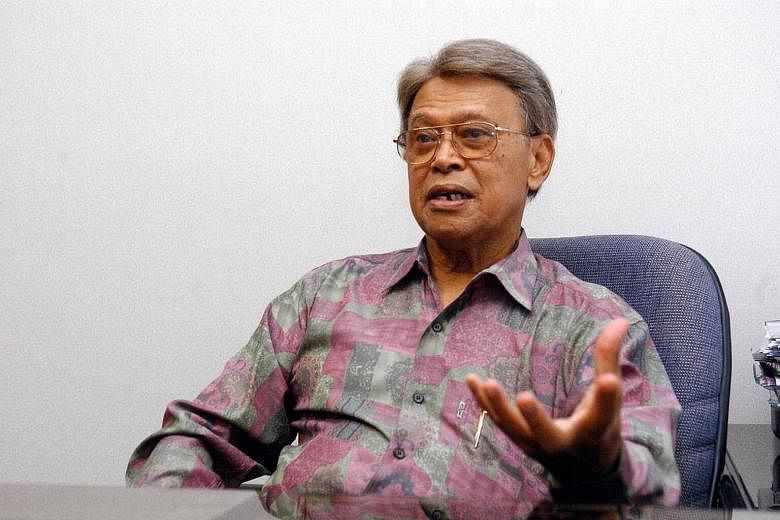This article was first published in The Straits Times on May 30, 2009
The crowd of 50,000 at the Padang was jubilant. Facing them, Mr Othman Wok introduced their new leaders.
He was the evening's master of ceremonies. But midway, his party boss intervened.
"Mr Lee Kuan Yew asked me to sit down and let the radio announcers do it," recalls the 84-year-old with a chuckle.
The order was not an indictment of his ability. It was to show party solidarity.
The People's Action Party (PAP) had achieved a historic victory. It had won 43 out of the 51 seats in the island's first legislative assembly election and was to form the first Government helmed by locals in colonial Singapore.
All 51 PAP candidates - including those who lost - were seated on the City Hall steps to celebrate Singapore's transition to a self-governing state.
For Mr Othman, then a 35-year-old newspaper editor, the rally on June 3, 1959, was a night of bittersweet moments.
Four days earlier, on May 30, 1959, Mr Ali Alwi of the United Malays National Organisation (Umno) had defeated him in Kampong Kembangan, by 244 votes.
Malays in the ward were highly suspicious of the PAP.
Recalling the odds, he says: "No Malay would volunteer to help in my campaign.
"My wife and relatives helped me put up the election posters. But all the posters were torn down. Some were smeared with human excreta. When I went house to house with pamphlets, they looked at me and said '(This is a) Malay kampung', and tore them up in my face."
Mr Othman had joined PAP shortly after its founding in 1954. A deputy editor of the now-defunct Utusan Melayu, a Malay-language daily, he was swiftly asked to join the editorial team of the PAP's newsletter, Petir.
Though the PAP was viewed by the Malays as a Chinese party that held little regard for Malay interests, Mr Othman was convinced it would help improve the lot of his community.
He wanted his people to become educated and make good on their own merit, as opposed to receiving handouts or being given special privileges.
It was not a popular view.
PAP candidates in two other Malay-dominated wards - Geylang Serai and Southern Islands - were also beaten by Umno men.
Undeterred, Mr Othman went on to help residents in the Kampong Kembangan constituency even though he had lost there.
"We had said that if the PAP won the election and formed the Government, we would deliver what we had promised to the whole of Singapore, including the constituencies where we lost," he said.
For months, no Malays turned up at his weekly Meet-The-People sessions held on the verandah of a Chinese resident's house in Jalan Lapang.
But Chinese and Indian residents turned up, seeking help with citizenship, jobs and financial matters.
Much later, an Umno man showed up, to discuss clogged drains, mosquitoes, potholes and the lack of street lighting.
"I told him I would look into this problem, but suggested he also get the kampung folk to gotong royong - work together - with my branch chaps, who were mainly Chinese," says Mr Othman.
"I told him to go back and discuss it with his kampung folks. Two weeks later, he came back and said they agreed."
Over several Sundays, they helped clear the drains and repair a number of dirt roads, and once-hostile constituents began to develop a relationship with their PAP man.
Their elected Umno MP was not around.
After Mr Othman was posted to Kuala Lumpur in 1961 to work at Utusan Melayu's head office, the party asked Mr Ariff Suradi, a trade unionist, to look after the ward.
Mr Ariff won the seat handsomely in the 1963 general election, defeating incumbent MP Ali Alwi by 3,435 votes.
In that election, Mr Othman was fielded in Pasir Panjang, where he won. He went on to serve as minister for social affairs from 1963 to 1977.
The PAP's win in Kembangan, and in the other two largely Malay seats, annoyed Umno.
Mr Othman said several of its leaders went on to incite racial tensions, sparking the July 21, 1964 riots, a blot on Singapore's history.
Significantly, Mr Othman says self-government in 1959 enabled Malay Singaporeans to uplift themselves - alongside their countrymen - through education so they could claim an equal share in the country's development.
"Kuan Yew told me: 'Othman, have no worries. In the next 30 years, the Malays in Singapore and the Malays in Malaysia will have the same colour of hair, same colour of skin, same religion, but inside here (pointing to his head) different, the way of thinking,'" he recalls.
"He's right. We Malays in Singapore are now more open-minded, not like before. That communal feeling is all gone."


